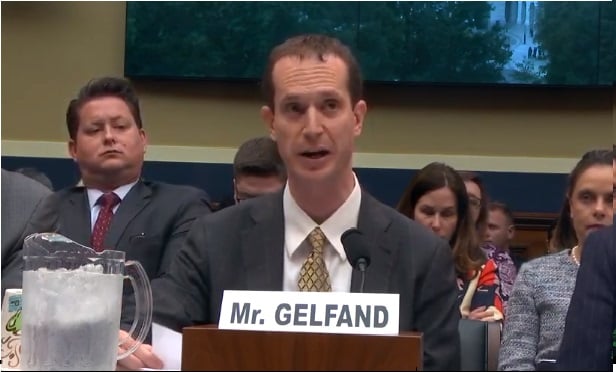 “These 'solutions' do not end surprise billing ,” ERISA Industry Committee's James Gelfand said. “They merely change who is subject to paying the surprise bill.” (Photo: House Energy)
“These 'solutions' do not end surprise billing ,” ERISA Industry Committee's James Gelfand said. “They merely change who is subject to paying the surprise bill.” (Photo: House Energy)
Health care providers seem to like the idea of using arbitration to resolve disputes over billing for out-of-network claims.
Employers, health insurers and patient advocates seem to hate the idea.
That conflict surfaced Wednesday, in Washington, at a House Energy and Commerce health subcommittee hearing on ”surprise medical bills.”
Related: Balance-billing court cases force hospitals to justify charges
Policymakers are using the term “surprise medical bills” to refer to unexpected cases of balance billing, such as situations in which patients verify that they are getting care in-network but end up receiving bills from out-of-network providers anyway.
Sonji Wilkes, a patient advocate, talked about going to the hospital to have a baby. The hospital and her physician were in-network providers. But her baby turned out to have hemophilia. The hospital had brought in an outside company to run its neonatal intensive care unit. The company that ran the NICU was outside of Wilkes' health plan's networks. Wilkes' baby ended up receiving out-of-network care without her realizing it, and the NICU care provider sent her a $50,000 bill.
The House Energy health subcommittee convened the hearing partly to talk about a discussion draft version of the “No Surprises Act” bill. Bill drafters hope to prevent the kinds of billing problems that Wilkes faced.
James Gelfand, senior vice president for health policy at the ERISA Industry Committee (ERIC) — a group for large employers — said his organization would like to see the following rules adopted:
1. An in-network matching rate guarantee: This provision would require every provider who treats a patient at a facility in the patient's network to bill the patient at the patient's in-network rate.
2. An emergency care cost benchmark: ERIC says the government could set a benchmark rate schedule, such as a schedule based on Medicare reimbursement rates, for out-of-network emergency care. If a health plan and a provider could not come to an agreement on the price of a service on their own, they could use the benchmark price as the price.
3. An informed consent requirement: This rule would require in-network providers to let patients know if the in-network providers were passing patients over to out-of-network providers.
Gelfand said ERIC opposes the idea of using arbitration to resolve disputes over surprise bills.
“These 'solutions' do not end surprise billing ,” Gelfand said, according to a written version of his remarks. “They merely change who is subject to paying the surprise bill. As such, binding arbitration enshrines the current strategy of certain medical providers to eschew networks and generate surprise bills.”
ERIC often ends up agreeing with America's Health Insurance Plans on health policy issues and disagreeing with Families USA, a consumer and patient advocacy group.
At the hearing Wednesday, the ERIC and AHIP witnesses agreed with the Families USA witness about use of arbitration to resolve disputes over out-of-network bills.
“Including billed charges in any payment methodology for resolving surprise bills, including a benchmark rate or an arbitration system, would inflate costs and ultimately harm consumers,” according to Claire McAndrew, a Families USA staffer.
In defense of arbitration
Dr. Vidor Friedman, president of the American College of Emergency Physicians, and Thomas Nickels, executive vice president at the American Hospital Association, said they believe arbitration is already working well to prevent and address surprise bill problems in New York state.
Nickels cited researchers who found that New York state's arbitration law has reduced out-of-network billing by 34 percent, without about half of disputes being resolved in favor of the patient and about half being resolved in favor of the plan.
Air ambulances
One issue that has caught lawmakers' attention, especially in large, mostly rural states, is stories of people who are facing health crises ending up in air ambulances without their conscious consent, and later receiving $100,000 emergency air transport bills.
Rick Sherlock, president of the Association of Air Medical Services, gave the air ambulance service providers' said.
He said that some insurers and health plans resist covering any air ambulance providers or ask for unrealistically low rates.
“Emergency air medical crews respond to those requests within minutes, day or night; they are ready to respond to the most seriously ill or injured patients on a 24 hours-per-day 7 days-per-week basis,” Sherlock said. “Air medical crews are dedicated critical care providers, with higher levels of training, equipment, and experience than most ground ambulance providers. Air medical pilots are some of the most experienced in aviation…. AAMS would ask the committee to recognize the tremendous commitment that these individuals make to ensure critical emergency medical response is always available to the communities they serve.”
Sherlock also asked for states to make insurers do a better job of working with emergency air medical services.
He noted that about 40 percent of air ambulance services claims are denied at first, and that about 40 percent of the denials are due to the insurer's belief that air transport was not medically necessary.
It's unfair to deny payments to the air ambulance provider for that reason, because the decision to call the air ambulance was made by a first responder or attending physician, not by the air medical program, Sherlock said.
Resources
Links to hearing resources, including a video recording of the hearing, are available here.
Read more:
- Is outlawing surprise medical bills really in consumers' best interests?
- Majority of people have received unexpected medical bills in the past year
- Jury deems Centura Health $230K surgical bill 'unreasonable,' awards $766
© 2025 ALM Global, LLC, All Rights Reserved. Request academic re-use from www.copyright.com. All other uses, submit a request to [email protected]. For more information visit Asset & Logo Licensing.







